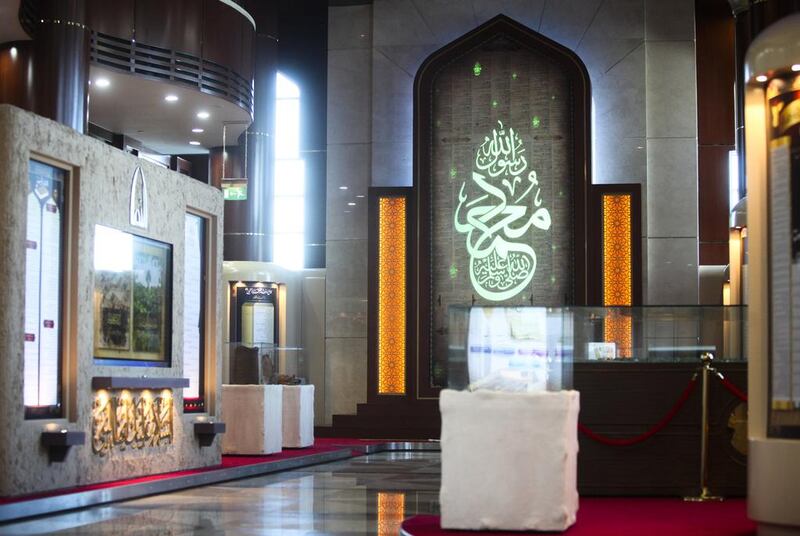DUBAI // To find out where the Prophet Mohammed’s house was, just press a button and watch it light up.
A new display exhibit in Dubai recreates in miniature the city of Mecca exactly as it was 1,435 years ago.
About two and a half metres square, the model transports visitors back to a Mecca of small, winding alleyways, traditional houses of mud, stone and wood, wells, palm trees and shrubs, all clustered across a mountainous terrain. And in the midst of all these homes is a tiny house near the holy Kaaba, where the Messenger once lived.
Next to Mecca is a miniature model of another city, Madina, and a wall-length interactive map of the Hijra (migration) of the Prophet Mohammed from Mecca to Madina, showing the route of his followers and the villages they had passed through on the historic journey.
The display is part of Alssalamu Alaika Ayyuha Annabi (Peace be upon you, oh Prophet) museum inside the new Dubai International Holy Quran Award building which opened last month.
It is a branch of the Prophet’s Museum founded in Mecca by Dr Nasir Al Zahrani, a Saudi religious scholar, writer and poet, who has brought his vision to Dubai as part of what he calls a “universal humanistic project”.
The new Quran award building in Mamzar, across from the Cultural and Scientific Association, is an impressive structure designed to look like an old palace with Islamic calligraphy on the ceilings and walls. Its Dh60 million cost was donated by Sheikh Mohammed bin Rashid, the Vice President and Ruler of Dubai.
Now open free to the public, and with texts in both Arabic and English, the Prophet’s Museum, or rather “project”, as the organisers call it, houses more than 1,500 items, along with hundreds of documents that can be browsed with touch-screen displays and audio. Called The Encyclopedia, the database was created by religious scholars and experts has been declared the largest and most inclusive Islamic encyclopaedia of everything that is mentioned in the Holy Quran and the Sunnah.
“You rediscover every step of Prophet Mohammed’s life and learn more about Islam and its many sides,” says Dr Ahmed Al Ghamdi, a Saudi scholar and researcher who works at the museum.
The centrepiece model of Mecca also illuminates the homes of other important historic Islamic figures and the final resting places of everyone from the Prophet’s wives to his closest companions.
It is just part of the story that tells the life of the Prophet from his birth to his death, including everything known about his life, from the kind of combs and pots he would have used, to the clothing he wore in battle and the food and medicines he would have taken.
“All the rights, of women, of children, of non-Muslims, of animals and even plants, are all written up here along the walls for everyone, Muslim and non-Muslim, to learn more about and understand Islam better,” says Dr Al Ghamdi. “No matter how knowledgeable you are, I am sure you will learn something new here.
“You just click here, and you can find out everything you want to know. If you want to see the whole family tree of the Prophet Mohammed, and then move on to the other prophets like Moses and Jesus and find out everything about them through our electronic library. You can spend months here researching.”
A 3-D interactive film takes visitors inside the Prophet’s home, showing how he lived.
Also recreated is the Prophet’s ring, with “Mohammed Prophet of Allah’ carved on the red orange stone known as “Aqeeq Yemeni”, a type of agate he used as his personal seal when stamping documents.
“We don’t have anything that Prophet Mohammed actually owned, but we used extensive research, from what was mentioned in the Quran, the Ahadeeth [sayings by the Prophet], and whatever was passed down via oral history, to bring the objects back to life,” says Yasser Abdul Mohsen, the other researcher working at the museum.
“There are plans to start a special kitchen where the kind of food he ate will be cooked and served, and we are also planning to start a pharmacy that makes the herbal and traditional medicine as used and advised by Prophet Mohammed available to the public.
“When you come here, you will be taken back to his time and gain so much wisdom and knowledge as you go through his sayings and deeds.”
Next month a centre for Quranic manuscripts will open in the Quran award building, with hundreds of old Qurans, including pages from a new Quran commissioned by the UAE.
Almost half of this Quran had already been completed by two renowned master calligraphers, Mohammed Deeb Galoul, 55, from Syria, and Bajar Al Erbili, 49, from Iraq. They were chosen in 2012 by Dubai International Holy Quran Award from 30 of the top calligraphers in the world who sent in bids to work on the new edition.
The Quran was ordered in a decree from Sheikh Mohammed bin Rashid for the printing and distribution of a million copies of the Sheikh Khalifa bin Zayed Al Nahyan Mus’haf, named after the President.
The new manuscript centre will also feature a collection of poems written by Sheikh Mohammed, including one about the Prophet embroidered on cloth. Also made from fabric is a large Quran, sewn by Mohammed Maher from Syria.
“This new building was built on the generosity and patronage of his Highness, Sheikh Mohammed bin Rashid, and it will help expand the activities and the role of the Quran award within the community and beyond,” said Ibrahim Bumelha, adviser to Sheikh Mohammed on cultural and humanitarian affairs and chairman of the Quran award’s board.
The museum is open from 10am to 1pm and from 6pm to 9pm. There is more information about the Prophet Project here, and about the Dubai International Quran Award here.
rghazal@thenational.ae






